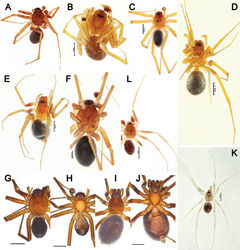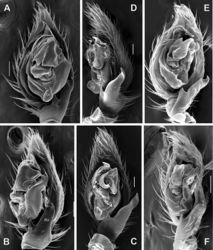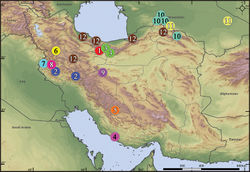Acanthinozodium dorsa
| Notice: | This page is derived from the original publication listed below, whose author(s) should always be credited. Further contributors may edit and improve the content of this page and, consequently, need to be credited as well (see page history). Any assessment of factual correctness requires a careful review of the original article as well as of subsequent contributions.
If you are uncertain whether your planned contribution is correct or not, we suggest that you use the associated discussion page instead of editing the page directly. This page should be cited as follows (rationale):
Citation formats to copy and paste
BibTeX: @article{Zamani2021ZooKeys1035, RIS/ Endnote: TY - JOUR Wikipedia/ Citizendium: <ref name="Zamani2021ZooKeys1035">{{Citation See also the citation download page at the journal. |
Ordo: Araneae
Familia: Zodariidae
Genus: Acanthinozodium
Name
Acanthinozodium dorsa Zamani & Marusik, 2021 sp. nov. – Wikispecies link – ZooBank link – Pensoft Profile
Type material
Holotype ♂ and paratypes 26♂16♀ (MMUE), Iran: Fars Province: 50 km NE of Shiraz, Bamoo reserve area, 29°45'N, 52°45'E, 18–28.05.2000 (Y.M. Marusik).
Etymology
The specific epithet is a Persian feminine name meaning “precious”. Noun in apposition.
Diagnosis
The male of the new species differs from all congeners in the region by the prolateral outgrowth of the median apophysis projecting ventrally (vs. not projecting) and the long and broad RTA, apically twisted and lacking outgrowths (vs. with 1–2 outgrowths). The female is most similar to A. elburzicum sp. nov. but differs by the epigynal hood being longer than wide (vs. wider than long) and less separated receptacles (ca. 2.5 times of their diameter vs. 4).
Description
Male (holotype). Habitus as in Fig. 18C. Total length 3.85. Carapace 1.87 long, 0.89 wide at pars cephalica, 1.39 wide at pars thoracica. Eye sizes and interdistance of PMEs: AME: 0.15, ALE: 0.12, PME: 0.09, PLE: 0.09, PME–PME: 0.20. Carapace yellowish brown, darker at pars cephalica. Sternum, labium, maxillae and chelicerae light brown. Legs yellowish, without annulations. Abdomen dark brown dorsally, pale ventrally. Spinnerets pale, uniform in color. Measurements of legs: I: 8.20 (2.02, 0.68, 1.90, 2.19, 1.41), II: 6.89 (1.68, 0.68, 1.49, 1.99, 1.05), III: 7.23 (1.88, 0.64, 1.45, 2.13, 1.13), IV: 8.71 (2.18, 0.62, 2.11, 2.70, 1.10).
Palp as in Figs 14I, 21A–C, 24C, D. RTA long and broad, almost as long as the bulb, twisting ventrally toward the apex; ventral apophysis small and finger shaped; tegulum with posterior process; median apophysis (Ma) with a distinct prolateral projection, winding ventrally to a blunt tip; embolus (Em) originating at about the 8:30 o’clock position; embolus proper thin and slightly curving near the base and apex.
Female. Habitus as in Fig. 18D. Total length 4.46. Carapace 1.93 long, 0.96 wide at pars cephalica, 1.46 wide at pars thoracica. Eye sizes and interdistance of PMEs: AME: 0.15, ALE: 0.12, PME: 0.09, PLE: 0.10, PME–PME: 0.15. Coloration as in male. Measurements of legs: I: 6.58 (1.39, 0.56, 1.52, 1.88, 1.23), II: 6.49 (1.62, 0.69, 1.34, 1.77, 1.07), III: 6.24 (1.71, 0.63, 1.25, 1.85, 0.80), IV: 8.45 (2.24, 0.72, 1.90, 2.60, 0.99).
Epigyne as in Fig. 30F–I. Epigynal plate over 3 times wider than long; anterior hood ca. 2 times longer than wide; receptacles subrectangular, separated by about 2.5 times of their widths.
Distribution
Known from the type locality in Fars Province, southern Iran (Fig. 33).
Original Description
- Zamani, A; Marusik, Y; 2021: Revision of the spider family Zodariidae (Arachnida, Araneae) in Iran and Turkmenistan, with seventeen new species ZooKeys, 1035: 145-193. doi
Images
|





